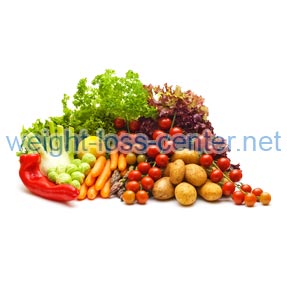It’s the “C” word, a word that we all hope to never hear from the mouth of our doctor, it’s cancer. If you have not been through this experience yourself then you are fortunate, but there is no one in North America whose life hasn’t been touched by this disease. In my life I have had a number of friends and family diagnosed with various types of cancer. Some have made it through their battle and some have not. In some of these cases the cause of their cancer was obvious and expected, such as smoking and hereditary breast cancer, but in many cases the reasons were not so clear. All I know is that I want to do as much as I can to help my body prevent cancer, and one of the best tools I have is following a healthy, balanced diet.

Losing weight is one good way of reducing your risk of cancer and so is eating a healthy diet that contains fruits, vegetables and less red meat.
According to the National Cancer Institute, “obesity increases the risk of cancers of the breast (postmenopausal), endometrium (the lining of the uterus), colon, kidney, and esophagus“. Losing weight, however, can lower the chances of these types of cancers substantially. This is good news for all of us dieters plugging along at losing weight. However, it’s not just weight loss that will help our bodies fight this disease, it’s also about what we eat and how we exercise. There are lots of ways to lose weight, but extreme dieting methods like crash diets and fad diets that are not nutritionally sound are not the answer here. Instead, a healthy weight loss diet that is nutritionally balanced, high in fiber, full of antioxidants and contains healthy fats is your best chance at fighting cancer with what you eat.
There are no magic foods that are going to completely ensure that you do not get cancer. However, there are some that have powerful nutrients that can help you avoid it in some cases. One of these foods is fats. Fats are key in any diet and some are particularly good at preventing some types of cancer. Examples of these healthy and cancer fighting fats are conjugated linoleic acid (CLA) and omega-3 fatty acids (see the related post “Omega-3 Improves Insulin and Weight Loss“). There are other unhealthy types of fats that should be avoided, such as trans fats and saturated fats. Eat more unsaturated fats like canola, sunflower, olive oils instead of vegetable oil or lard. The fats found in nuts are good for you as well. Fish oils are great for the body too and come in supplement form.
Other foods to eat as part of a healthy weight loss diet and anti-cancer diet are raw fruits and vegetables. These types of foods are naturally high in fiber, which may help to lower the risk of colon cancer. The other important parts of vegetables and fruits are the phytonutrients they contain that have cancer-fighting properties. For example, Anthocyanins that are the red pigments found in the skin of red grapes, berries, and yams are powerful antioxidants that help to remove free-radicals from the body that may cause cancer. Another example is broccoli, cabbage, brussel sprouts, turnips, and dark green leafy greens that contain indoles, which are phytonutrients that act on enzymes that are important to the body’s cancer fighting mechanisms.
Lowering your consumption of fatty meats and red meat is also a part of a healthy weight loss diet that may prevent cancer. Numerous studies have found a link between the consumption of red meat and cancer, particularly colon cancer. It has been hypothesized that the connection between meat consumption and cancer risk has to do with the animal proteins, saturated fats, and carcinogenic compounds such as heterocyclic amines (HCA) and polycyclic aromatic hydrocarbons (PAH) that are formed during the cooking of meat. Fatty meats are also high in hormones that may cause hormone-related cancers, such as breast cancer. All this is not to say that following a healthy weight loss diet to prevent cancer has to be void of all meats. Instead, limit your meat consumption to two to three times a week at most and choose only lean meats, such as poultry and lean cuts of beef. Even better, substitute red meats with seafood items, such as fish and shrimp, or with soy products, such as tofu and textured vegetable protein.
Just as exercise is an important part of losing weight, it is also an important part of cancer prevention. Exercise gets everything flowing and moving, which can help the body rid itself faster of potential cancer-causing chemicals. Studies have found that regular exercise can reduce the chances of someone developing breast and colon cancer. Other studies have found that exercise may also reduce the risk of prostate, lung, non Hodgkin’s lymphoma, ovarian, testicular and uterine cancers. So if shedding those excess pounds isn’t enough motivation to get you off your butt and exercising at least 30 minutes every day, then perhaps the idea of a cancer-free life will.
Keep in mind that following a healthy weight loss diet does not guarantee you will not at some time develop cancer, however you will be taking steps to minimize this chance. If anything, following a healthy and nutritionally-balanced weight loss diet with regular exercise will help you rid your body of extra weight and improve overall health. Bodies that are nourished with a healthy diet and function optimally will have better immune systems, and those are the ones that have the best chance of recovery or remission – or avoiding cancer all together. Be healthy, be happy, cherish your health and don’t take anything for granted.
Other Related Posts and Articles you May Find Interesting: “Alcohol Affects Risks of Cancer and Heart Disease in Women”, “Eating Organic Foods” and “Best Foods for Weight Loss”.





Science shows a stronger link between our diet and cancer every day. Fresh fruits and vegetables are always your best bet.
A healthy diet, from whichever direction, is good for the body.
What we eat is what we get, so a healthy diet surely goes a long way preventing disease, which may include the big “C”.